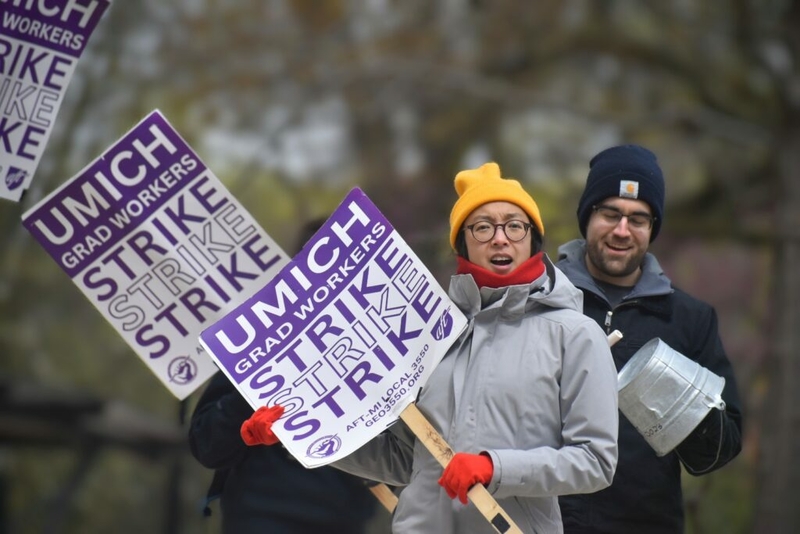U of M and graduate workers settle unfair labor practice charges, school drops lawsuit for damages

While a strike by University of Michigan graduate student workers stretches into its third month, a settlement has been reached on several unfair labor practice (ULP) charges that were pending with the Michigan Employment Relations Commission.
The strike by the Graduate Employees’ Organization (GEO) AFT Local 3550 began March 29, with economic issues being the main point of contention.
The union, which is an affiliate of the American Federation of Teachers (AFT), represents approximately 2,300 graduate student instructors and graduate student staff assistants at U of M.
On Thursday, the GEO announced that both sides agreed to drop their respective ULPs, while the university consented to drop its suit for damages against the union.
“The administration’s approach to its negotiations has relied almost exclusively on legal stunts rather than serious bargaining,” said Jared Eno, president of GEO. “They called in a mediator, sought an injunction, filed ULPs, sued us for damages, initiated state-led fact-finding, and are threatening workers with prosecution. It seems the university will do anything to avoid dealing with its own workers.”
The GEO said it filed several ULPs over what it termed “the administration’s consistent failure to comply with even the minimal requirements of state labor law to bargain in good faith by holding up bargaining over permissive subjects and making unilateral changes to mandatory subjects like compensation and safety.”
The union also said the administration’s agreement to drop its suit for damages demonstrated that it was an intimidation tactic.
The university, however, said the union agreed that the suit can be refiled at any time.
“It’s important to note that the legal avenues the university had taken in response to the union’s actions are the customary steps in collective bargaining when one party openly violates a contract or one party is unwilling to compromise,” Kim Broekhuizen, the university’s director of public affairs told the Michigan Advance. “Many of them, such as mediation and fact finding, are legal mechanisms available to both parties and are designed as constructive avenues to assist the parties in reaching an agreement.”
Broekhuizen adds that a prior decision issued by an administrative law judge that GEO committed an unfair labor practice by striking in violation of its contract will stand and will not be withdrawn or appealed.
U of M contends the union breached its contract when it went on strike prior to the May 3 termination date.
University negotiators last met with the GEO on May 31, for what was the 37th day of bargaining. The university said that GEO presented no counter offer to a comprehensive package proposal provided on May 12, which had been rejected by union members.
GEO has been seeking a 60% wage increase in the first year of a new contract, with additional increases tied to inflation in the second and third years. University officials said they have put forward multiple counter-offers, including an 11.5% pay increase over the next three years, but all have been rejected by the GEO.
The university said it is still awaiting a counter proposal from GEO to its latest offer. The school said while the union proposed only one day for bargaining in June, the university offered to meet daily in order to reach a resolution.
“Again, amidst an ongoing strike that has implications for thousands of workers and tens of thousands of students, GEO has agreed to one day of negotiations. That alone shows the union’s lack of seriousness in working toward a resolution,” said Broekhuizen.
However, Evelyn Smith, GEO’s lead negotiator said their bargaining team, made up exclusively of graduate workers with full-time jobs, is focused on negotiating a new contract for their members.
“It’s time for the administration to get serious about these negotiations and give graduate workers an offer that meets our needs,” she said.








